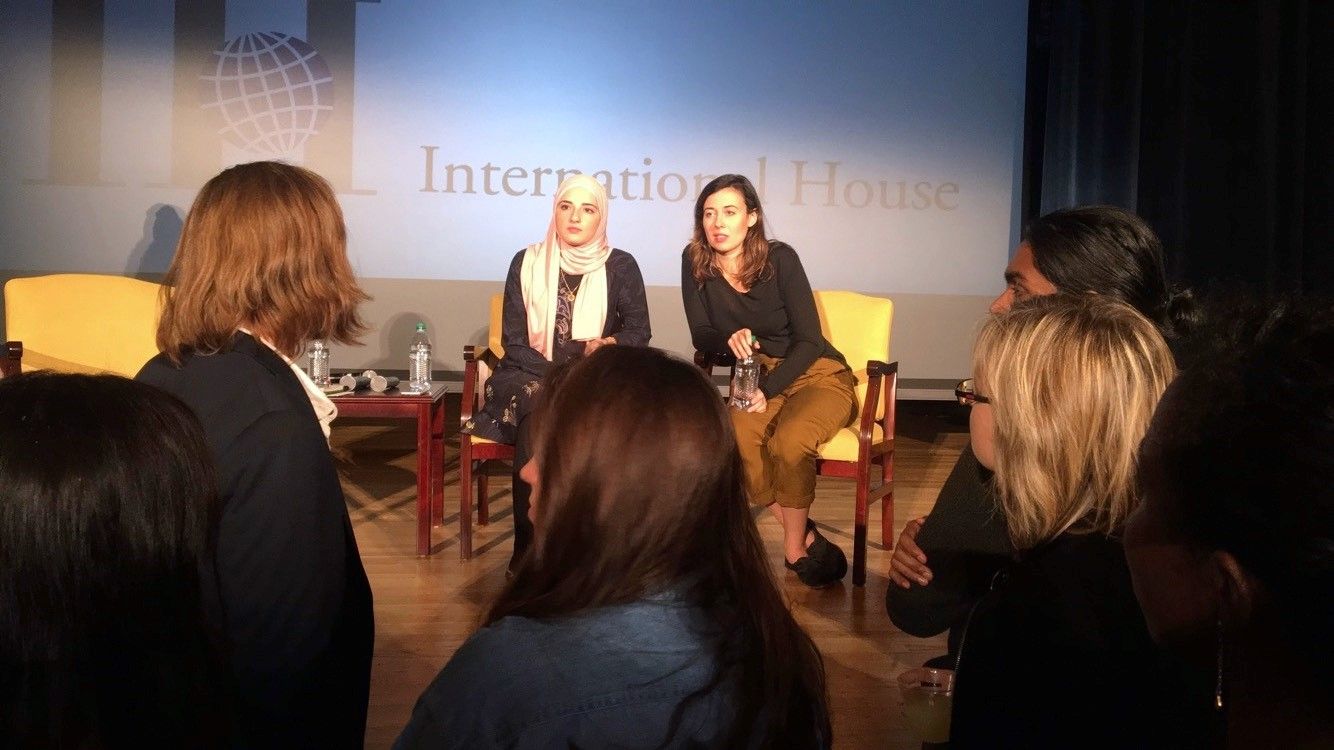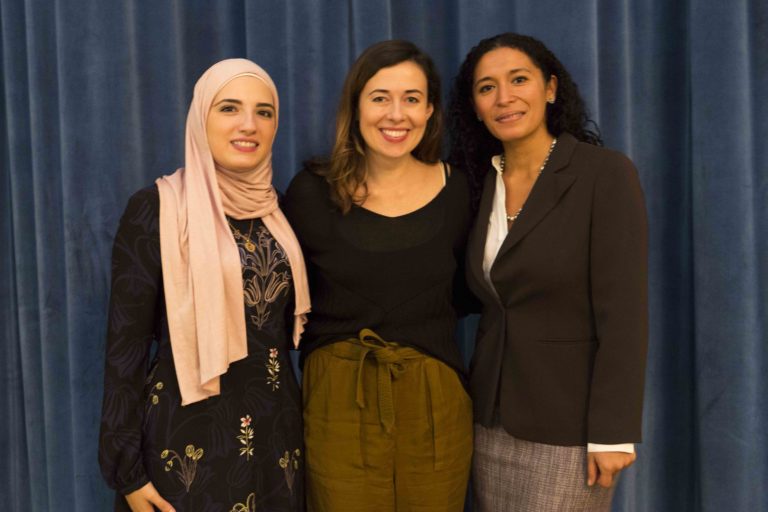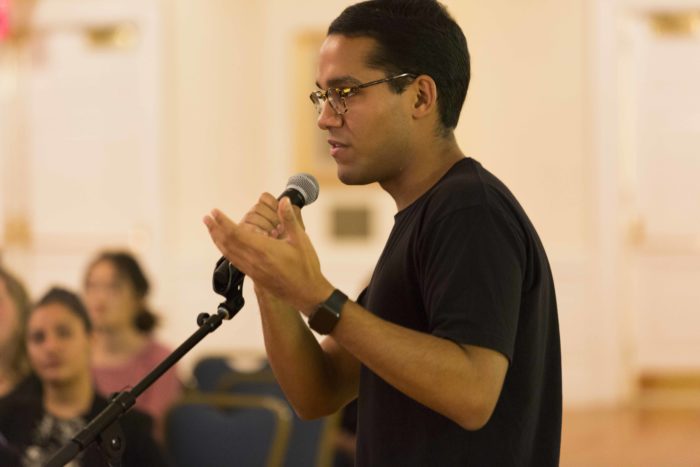
The Path of Moral Courage: Stories of Real-Life Heroes
 On November 1, 2017 Residents gathered in Davis Hall to hear the stories of Ala’a Basatneh and Amanda Bailly, humanitarian activists dedicated to raising awareness about the ongoing Syrian War crisis.
On November 1, 2017 Residents gathered in Davis Hall to hear the stories of Ala’a Basatneh and Amanda Bailly, humanitarian activists dedicated to raising awareness about the ongoing Syrian War crisis.
The conversation was moderated by Jihan Hafiz, an Egyptian-Samoan journalist and award-winning documentary filmmaker whose many achievements include creating the critically-acclaimed documentaries “Benghazi Rising,” “Fists Up! Fight Back!” and “Son of War.” Among her awards, Hafiz received an Emmy for her sound recording work on the documentary about the Egyptian revolution “In Tahrir Square.”
Given her close ties to the Middle East and acute awareness of the challenges civilians in war-torn regions face, Hafiz asked heartfelt questions that struck a chord with I-House Residents. The passion and empathy in the room was perceptible as Basatneh and Bailly shared their stories of real-life terrors and tragedies on the ground trying to help Syrian refugees.
Basatneh had lived in Chicago nearly her whole life before she became a political activist at age 19. She heard about schoolchildren suffering in Syria, her birth country, and “all I saw was my laptop in my room,” she said. At that moment she realized, “This laptop [was] going to be the window to that world. That’s how I started connecting to activists and journalists on the ground” in Syria when the crisis began.
Basatneh’s documentary film, “#chicagogirl: The Social Network Takes on a Dictator,” made waves around the world upon its release in 2013. Basatneh wanted to make the film because, “We need to show the world what the [Assad] regime is covering up,” she said. “I will never give up.”
Bailly is an American currently living in Beirut whose documentary film “8 Borders, 8 Days” came out earlier this year and chronicles the dangerous, heart-wrenching journey of a Sham, a mother fleeing Syria alone with her two young children. Headed to Germany, they risk their lives to travel by dinghy boat across the Mediterranean. It had gotten to a point in Syria where the bombing and lack of basic resources was so bad that, as Bailly explained, “the prospect of living a dignified life is almost impossible.”
Bailly explained that Syria is so war-torn to this day that, as a single woman, “you’re left with no protection [and are] completely susceptible” to torture, sex trafficking or murder traveling alone as an illegal refugee. But the risk was necessary for Sham, as it was safer to go out in the dinghy than it is to stay in Syria. The situation is a “forced migration,” Hafiz added, “what comes from this is the human spirit that persevered.”
In addition to Sham, Bailly has met numerous other Syrian refugees and victims of the war. Over the course of a journey, women often face sexual violence, physical violence and more from the police of bordering countries who refuse entry. And for those who do manage to make it to safety, there is the devastating chance that other family members or loved ones might be lost. As Bailly explained, “Recently I interviewed an 11-year-old girl and a 22-year-old girl whose whole family was killed by a U.S. airstrike.” Basatneh personally lost loved ones, explaining, “I lost friends who died during protests, [just from] holding cameras up.”
People who escape Syria to its neighboring countries often face discrimination and violence, and “they feel like they’re dying every day,” Bailly explained. Inside Syria, Basatneh said that today “all three borders are closed,” so it’s extremely dangerous to try to leave as a refugee or to enter to bring humanitarian aid. “If you’re in Syria and you say the wrong word or answer a question wrong, you could be tortured or killed on the spot,” Basatneh said.
What started as social media activism for Basatneh became a trip to Syria itself to try to bring aid to her people. She found that “the UN can’t send convoys until they know it’s safe — but it’s not, so they can’t.” So Basatneh took matters into her own hands. She told I-House Residents of her harrowing tale to try to get into Syria with bags of medicine for a town that had very little left.
To get the medicine into the country, Basatneh explained how she walked across a minefield for thirty-five minutes. “Every step I took, I thought I was going to die.” When she arrived, “it was a ghost town with snipers everywhere.”
Basatneh recalled how, during her time in Syria, a bomb-filled plane flew overhead and “people [were] running in different directions — [but] where do you run from a plane with bombs?” The Syrian regime had bombed all the hospitals, so she brought the medicine to underground clinics. Her heroic effort was truly lifesaving.
These human rights abuses in Syria are still going on today. In recent years, the Assad regime has devastated Syrians with “many chemical attacks,” once thought of as the “red line” that, once crossed, would incite the world to respond to the crisis, Bailly said. She emphasized that “the refugee crisis will not end without an end to the war.”

When asked what I-House Residents and people in countries like the U.S. can do to help, both Basatneh and Bailly stressed the importance and impact of calling state representatives to demand support and assistance be provided for the Syrian people. Because it’s virtually impossible for NGOs and aid organizations to get into the country, donating money to charities is not the most effective way to make a difference.
The most rewarding thing I-House Residents and people in the U.S. can do, Bailly said, is “go local” by offering aid to U.S. based Syrian refugees in need of clothes, food, English language tutoring, and basic hygiene supplies. “Meet Syrian refugee families in your town,” Bailly said, “They need human contact to feel welcome.” Basatneh added, “When people don’t know about what’s going on in Syria it breaks my heart. We have to educate ourselves – to prove we are the land of the free.”